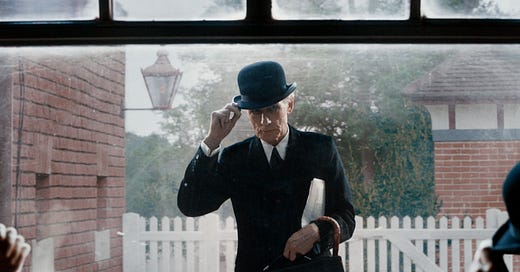In "Living," Bill Nighy achieves his final form
The great English actor Bill Nighy has rightly received an Oscar nomination for this magnificent performance.
Living (Dir. Oliver Hermanus)
Over his nearly five-decade career, the great English actor Bill Nighy has come to embody a particular vision of his native England. Through his varying performances that range from a Vincent Van Gogh aficionado, a soft-spoken union leader, and even a zombifying stepfather, Nighy has brought a certain stoicism that seems in many ways to emblemize England’s most gentlemanly qualities. He is the overpolite man at the train station with a virtuous demeanor, the well-dressed elder who quietly compliments your T-shirt as you pass on the street—oh wait, that’s just him in real life.
With Living, we receive not only Nighy’s single greatest performance to date, but also the crystallization of his gentleman persona. Here, Nighy plays Mr. Williams, a civil servant in 1950s London who has, over the course of decades working inside the paper-shuffling factories of English bureaucracy, become a comatose husk of a man. He takes the train to work each day dressed in the same crisp suits and bowler hat, travelling separately from his colleagues so as to avoid conversation. His expression, staid and stoic, never once offers a smile or laughter—it seems to have been frozen in indifference for a century or more.
Nighy, who speaks in a low voice that never rises above a catatonic mumble, is so perfectly attuned to the repression of a 50s English bureaucrat that you might be surprised to find that Living is a remake of a classic from an entirely different milieu. Ikiru, the 1952 Japanese film by master filmmaker Akira Kurosawa, serves as the inspiration for Living, adapted by novelist Kazuo Ishiguro. Ishiguro’s script is a very faithful rendition of the original, but this isn’t to say that the film offers nothing new. By transporting Ikiru’s postwar Japan to postwar England, Living finds a remarkably different perspective that highlights the particulars of English restraint.
Restraint isn’t enough to drive a film, however, and Living is about far more than an old man living an empty life. The film’s inciting event comes abrutply: Mr. Williams visits his doctor, and is diagnosed with an incurable cancer that gives him six months left to live. This leads Mr. Williams into a quest for meaning after a life spent unlived. He begins with a night of drinking and debauchery, meeting a stranger from a seaside town (Tom Burke) who shows him the ins and outs of alcoholic partying. Mr. Williams quickly discovers that this isn’t enough, and turns his attentions towards something more productive: He decides spend his remaining months forcing the city officials to build a children’s playground. A modest achievement, perhaps, but one that means something to the children play upon it and the mothers who watch.
Nighy, who has for years presented an image of English apathy as a symbol of virtue, is here doing something much more profound, capturing the hollowness that comes from a life spent in procrastination and the verve that comes from realizing it is near its end. After his diagnosis, Mr. Williams commits himself to experiencing life as best he can, and watching Nighy emerge from his cocoon of well-mannered malaise is a sight to behold. In one scene, he delivers a monologue about the lifelong pursuit of some gentlemanly ideal which has, over time, resulted in a meaningless existence. It is a fantastic moment that entirely vindicates Nighy’s Best Actor nomination.
Oh right, I forgot to mention: Nighy was nominated for an Oscar! And deservedly so! His talents have been known to the Academy for some time, but never acknowledged. This isn’t exactly surprising—English repression has never been known to draw audiences to a theater. But with Living, a wonderful achievement, Nighy has forced the Academy to recognize a lifetime of brilliant work.
The film features two excellent supporting turns from Aimee Lou Wood and Alex Sharp, who play young characters discovering the inept stagnancy of English bureaucracy. Director Oliver Hermanus does an exceptional job conveying the stuffed-shirt atmospheres of the English upper-class, helped greatly by Helen Scott’s appropriately drab set design. Living is sometimes overdramatic, dependent on the kind of soft lighting and musical score that overplays the film’s basic emotional resonance. If it weren’t for Mr. Nighy, we might have ended up with a much more overstated film.
But we did get Mr. Nighy in a culminative role that solidifies his iconic status. In interviews, screenwriter Kazuo Ishiguro has noted how the film could not exist without him: “By saying Bill Nighy, the ‘Englishness’ just sort of took care of itself… Everything was built around how it would look when Bill Nighy would do it.” Ishiguro understands perfectly what Nighy represents to the public, and has utilized his persona for the creation of truly magical.
Living is not a masterpiece like its progenitor Ikiru, but then again, not much else is. Rather, the film serves a emblematic case for Nighy’s excellence, which has personified a particular brand of Englishness over the course of several decades. Recognizing him at the Academy Awards would be a treasure indeed.
Living is playing in limited release.




The review is as gently profound as Nighy mate 🙌🙌🙌